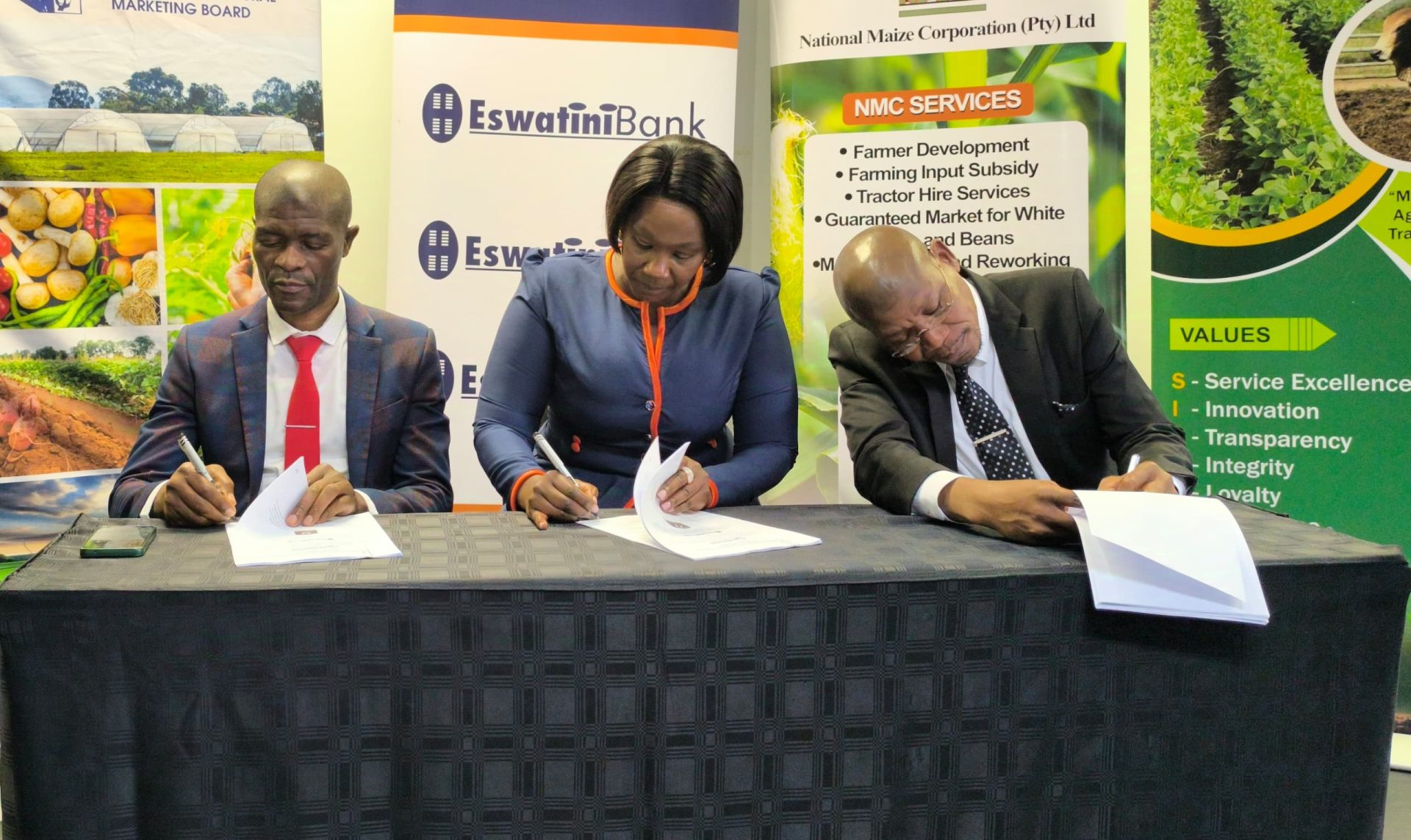By Delisa Thwala
Smallholder farmers are smiling at the bank.
This comes after the signing of the Memorandum of Understanding (MoU) between Eswatini Bank, National Maize Corporation (NMC), and NAMBoard.
The launch of the MOU took place on Thursday at the Tums George Hotel in Manzini.
Eswatini Bank Managing Director Nozizwe Mulela said this is a milestone in providing a credit guarantee that offers 20% cash cover for maize, beans, machinery, and horticultural commodities.
She further said the initiative marks a pivotal expansion of their previous focus on horticultural support, broadening their commitment to enhancing the agricultural landscape of Eswatini.
“As a long-standing player in the agribusiness financing industry, Eswatini Bank recognizes the necessity of collaborating with NMC and NAMBoard to craft this agreement, which prioritizes the needs of our farmers in Eswatini.
RELATED: Major profits for NMC
While this partnership may not address every challenge within the agricultural value chain, our farmers remain our central focus,” she said.
In addition, she said without their dedication and hard work, this initiative would not be possible, citing that the significant rise in agricultural production input costs, both locally and globally, has created an urgent demand for alternative financing models.
“Many smallholder farmers struggle to qualify for production credit due to insufficient collateral and high establishment costs. This MoU aims to address these challenges by reducing the inherent risks associated with agricultural financing.
Eswatini currently imports a considerable portion of its agricultural commodities for local consumption, a situation that is not sustainable for an independent nation,” she said.
Therefore, the Bank partnered with NMC and NAMBoard to fortify their agricultural value chains through this credit
guarantee, enhancing their ability to support local production.

“Eswatini is endowed with abundant land, water, and skilled personnel ready to engage in agricultural enterprises.
However, many farmers have indicated that the lack of financial instruments and effective marketing mechanisms are significant barriers to sustainability,” said Mulela
“We unite to tackle these gaps head-on. A large percentage of our population lives in rural areas where most people are engaged in informal work in the agricultural sector, which includes crop production, livestock, fisheries, and forestry.
These seasonal jobs have stimulated demand for local goods and have played a pivotal role in poverty reduction,” she added.
Meanwhile, the National Agricultural Marketing Board (NAMBoard) has always been committed to promoting a financially sustainable farming community. This was according to the NAMBoard CEO, Bhekizwe Maziya.
“Our vision is to see a thriving agricultural sector that significantly contributes to the economy of Eswatini. However,
RELATED: Eswatini Bank empowers small businesses in business development
we have observed that access to affordable finance remains a major challenge for our smallholder farmers. This challenge has often hindered their ability to expand and improve their farming operations,” he said.
In addition, he said In December 2022, they took the giant step by signing the first MOU with Eswatini Bank to provide a loan guarantee for the horticulture farmers.
This initiative enabled farmers to have access to a total book of E10M with the Bank. While this initiative has seen some successes, we recognized that the scope needed to be broadened to include the grain crops.
“Today, we are proud to announce the expansion of this revolving fund to include maize and beans, in collaboration with the National Maize Corporation (NMC),” he said.
NMC CEO Mavela Vilane said In November last year, His Majesty the King, in his closing speech at the Esibayeni people’s palace, instructed the government to run at an alarming speed, dubbed ‘Nkwes’ and improve service delivery to the nation.
Vilane said he was happy to report that NMC went back to craft its strategies to be in line with His Majesty’s call.

“Our main goal is to ensure that the country has enough food for the present and future needs to achieve food sovereignty.
The call for strategic grain reserves to cushion the country in the event of emergencies cannot be over-emphasized,” he said.
He further said Recent maize production statistics show that in the current financial year, the country will import over 66,000 metric tonnes of white maize.
“On the other hand, the same statistics show that the size of land that is usually put under maize production is around 70,000 hectares per season. This is a clear indication that the country is not having a shortage of land for maize production,” he said.
In closing, Vilane thanked the National Ciroin Farmers Association present.
He said they were grateful for the continued support they are getting from them and their members on an annual basis.
“Even though maize production was down by 12% in the current year, farmers were able to give us more maize this year compared to last year.
Last year, we were at 4600 metric tons by this time of the year, but this year are at 5400 metric tons. We are very grateful to our farmers,” he said.
He further gave assurance to the bank that they have farmers who have been consistently supplying them for over 10 years now.
“Their records are impressive, and we believe they emulate such performance even in the fund,” he said.


